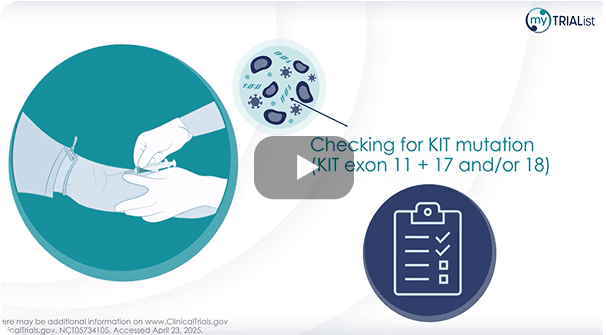
The Insight Study
A phase 3 study of ripretinib versus sunitinib in patients with advanced gastrointestinal stromal tumor (GIST) with specific KIT mutations who were previously treated with imatinib.
About the study
This is a study comparing ripretinib to sunitinib in people with GIST who have progressed on first-line treatment with imatinib and have specific KIT mutations (KIT exons 11 + 17 and or 18 mutations).
It aims to determine if a personalized treatment approach can be used in people with advanced GIST with specific mutations in KIT for second-line treatment.
The study has 2 main goals:
- 1Determine how well ripretinib works compared to sunitinib in this patient population
- 2Determine the safety of ripretinib compared to sunitinib in this patient population
Three key measures will be evaluated in the study:
- PFSProgression-free survival or time living without the tumor growing or spreading
- ORRObjective response rate or percent of participants who had their tumors shrink or disappear
- OSOverall survival or length of time participants are alive after the start of treatment
What is ripretinib?
- Ripretinib is a type of medication called a tyrosine kinase inhibitor (TKI) and is designed to treat advanced GIST
- Ripretinib is approved by the United States Food and Drug Administration (FDA) for the treatment of adult patients with advanced GIST who have received prior treatment with three or more kinase inhibitor medicines, including imatinib. In this study, ripretinib is an investigational drug, which means that it has not been approved by regulatory agencies for this specific use in second-line treatment
- The most common side effects associated with ripretinib include hair thinning or hair loss, tiredness, nausea, stomach (abdominal) pain, constipation, muscle pain, diarrhea, decreased appetite, and vomiting
- These are not all the possible side effects of ripretinib and your doctor can explain more to you

You might be eligible to join the study if you
are 18 years of age or older
have advanced GIST and radiologic progression on imatinib treatment
have a KIT exon 11 and a KIT exon 17 and/or KIT exon 18 mutation
What will happen during the study?
Prescreening
A blood test will be taken to confirm if you have the specific KIT mutation required for study participation
Screening
If the KIT mutation is confirmed, your study doctor will assess if you are eligible to participate in the study based on your medical history, vital signs, blood tests, and procedures
Randomization
Participants will either receive ripretinib or sunitinib. Participants will have a 2 out of 3 chance of receiving ripretinib and a 1 out of 3 chance of receiving sunitinib
Study treatment
Participants will take their assigned study medication as directed by their study doctor. Participants will be monitored and required to take their study medication until their participation in the study is over. The study schedule will be discussed with you during screening
Crossover
Those taking sunitinib whose GIST progresses will be given the option to switch to ripretinib
End of treatment
Participants will receive their assigned study medication until disease progression, unacceptable toxicity, or withdrawal of study consent
Frequently asked questions
Who is sponsoring this study?
Deciphera Pharmaceuticals is a pharmaceutical company headquartered in Waltham, Massachusetts, with research facilities in Lawrence, Kansas. Deciphera Pharmaceuticals is a biopharmaceutical company focused on discovering, developing, and commercializing important new medicines to improve the lives of people with cancer.
Please explore our website to find out more.
How can I find out if I am eligible for this study?
Talk to your doctor to determine if the INSIGHT Study may be suitable for you.
How are the study drugs given?
Ripretinib and sunitinib are both taken by mouth.
Will I be paid or given anything for taking part in this study?
You will not receive any payment for taking part in this study. The Sponsor may reimburse you or pay for study-related travel expenses. Please talk to the study staff about whether reimbursement or travel assistance may be available to you.
Who will pay for the costs of the study?
During the study, the Sponsor will pay the expenses for ripretinib and sunitinib and all study procedures. Expenses related to standard medical care for your condition are your responsibility (or the responsibility of your insurance provider or government program).



